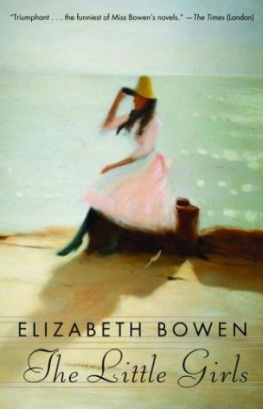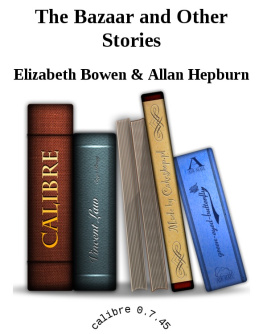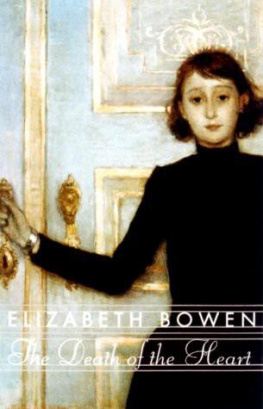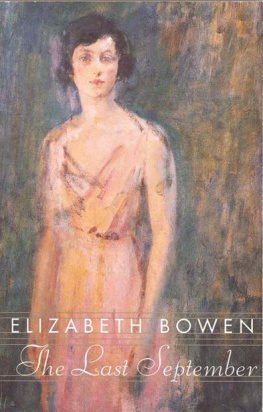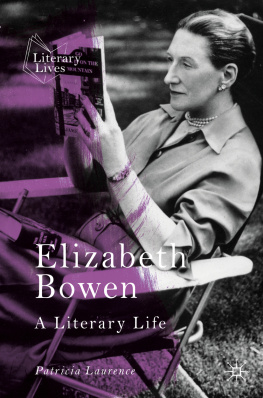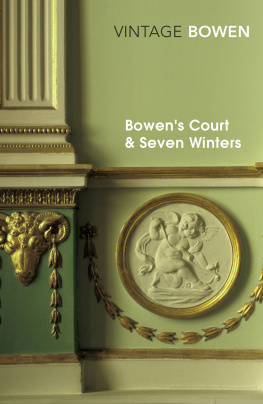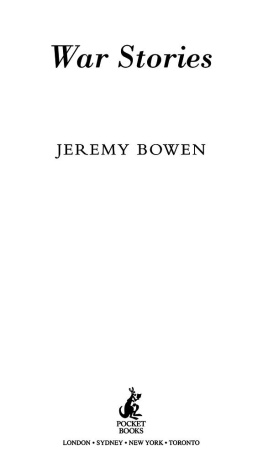Elizabeth Bowen - The House in Paris
Here you can read online Elizabeth Bowen - The House in Paris full text of the book (entire story) in english for free. Download pdf and epub, get meaning, cover and reviews about this ebook. year: 1935, publisher: Penguin, genre: Art. Description of the work, (preface) as well as reviews are available. Best literature library LitArk.com created for fans of good reading and offers a wide selection of genres:
Romance novel
Science fiction
Adventure
Detective
Science
History
Home and family
Prose
Art
Politics
Computer
Non-fiction
Religion
Business
Children
Humor
Choose a favorite category and find really read worthwhile books. Enjoy immersion in the world of imagination, feel the emotions of the characters or learn something new for yourself, make an fascinating discovery.

- Book:The House in Paris
- Author:
- Publisher:Penguin
- Genre:
- Year:1935
- Rating:4 / 5
- Favourites:Add to favourites
- Your mark:
- 80
- 1
- 2
- 3
- 4
- 5
The House in Paris: summary, description and annotation
We offer to read an annotation, description, summary or preface (depends on what the author of the book "The House in Paris" wrote himself). If you haven't found the necessary information about the book — write in the comments, we will try to find it.
The House in Paris — read online for free the complete book (whole text) full work
Below is the text of the book, divided by pages. System saving the place of the last page read, allows you to conveniently read the book "The House in Paris" online for free, without having to search again every time where you left off. Put a bookmark, and you can go to the page where you finished reading at any time.
Font size:
Interval:
Bookmark:

The House in Paris
Elizabeth Bowen
with an Introduction by A. S. Byatt
First published in Great Britain by Gollancz 1935 Published in Penguin Books in Great Britain 1946 Reprinted with an Introduction by A. S. Byatt 1976 Reprinted 1983, 1986
First published in the United States of America by Alfred A. Knopf, Inc. 1935 Published in Penguin Books in the United States of America by arrangement with Alfred A. Knopf, Inc. 1987
Copyright 1935 by Elizabeth Cameron Copyright renewed by Elizabeth D. C. Cameron, 1963 Introduction copyright A. S. Byatt, 1976 All rights reserved
Contents
Introduction
M Y relationship with The House in Paris has been odd, continuous and shifting, for roughly thirty years. It has had a disproportionate influence, both good and bad, on my ideas about the writing of novels and, indeed, about the nature of fiction. It seems proper to begin by explaining this since I do now believe it to be both the best of Elizabeth Bowen's novels, and a very good novel by any critical standards. But the reading process behind these judgments has been complicated.
I was given The House in Paris by my father when I was quite a small child, maybe ten or eleven, roughly the age of Henrietta in the novel itself. My father was under the impression that the book was a historical novel, having mistaken Elizabeth Bowen for the historical writer, Marjorie Bowen. I began the book, a compulsive reader, having already worked my way through most of Scott and much of Dickens, expecting to find a powerful plot, another world to inhabit, love, danger. I found instead my first experience of a wrought, formalized 'modern' novel, a novel which played tricks with time and point of view. A novel, also (and this I remember clearly as being supremely important), which clarified, or would have clarified if I had been clever enough to focus it, the obscure, complex and alarming relationships between children, sex and love. There were powerful phrases which lodged in my mind and have stayed there. 'Years before sex had power to touch his feeling it had forced itself into view as an awkward tangle of motives.' Or, 'The mystery about sex comes from confusion and terror: to a mind on which these have not yet settled there is nothing you cannot tell.' Or, 'There is no end to the violations committed by children on children, quietly talking alone.' I finished the book, deeply uncertain about what was happening, deeply troubled about how to judge the relative weight of any of the events or people. I read it, in fact, with a social, sexual and narrative innocence which was the equivalent of Henrietta's own. I learned, from that reading, two things. First, that 'the modern novel' was difficult: it stopped and analysed little things, when you wanted to get on with big things it made it clear to you that you did not understand events, or other people. And, more important, more durable, I learned that Elizabeth Bowen had got Henrietta right. Adult readers are too given to saying, of children like Henrietta, that 'real' children are not so sophisticated, so articulate, so thoughtful. What I remember with absolute clarity from this reading was a feeling that the private analyses I made to myself of things were vindicated, the confusions I was aware of were real, and presumably important and interesting, since here they were described. There is a sense in which Henrietta, and indeed Leopold, are more subtle images of the innocent or immature perception of adult behaviour than James's Maisie, in What Maisie Knew. Maisie is a tour de force, a brilliant creation, a vehicle both for James's technical mastery and for his moral commentary. But Leopold, and still more Henrietta, are children equipped with the language of the secret thoughts of intelligent children, with no more and no less than that. They make Maisie seem very much a creature of adult artifice.
After this innocent reading I put the book away for some years. In my late teens I read it again, several times; focused now much more on Karen and the central section of the novel, on love, passion, the breaking of convention, the moment of truth, the definition of identity. At that stage I think I saw the novel very strongly as a model of good writing, an example of how to be precise about thought, emotion, passion and character. To me then the restaurant scene in Boulogne, the bedroom scene in Hythe, seemed to be the central scenes, remarkable for concentrating so much passion in so few words, for the violence of life one looked for in books and feared to miss in reality.
Later still I came to think less well of the novel, dismissing it as too much a work of 'fine-drawn sensibility'. It seemed too much the novel-as-object, inexorably shaped and limited by its own internal laws. I had by then read James, Forster, Woolf, Ford: 'modernism' no longer shocked or confused me. I became a discriminating reader and saw merits in the heavy, broad, open-ended Victorian novels, admired by Dr Leavis and Iris Murdoch, which made Elizabeth Bowen's precise distinctions, her craftsmanship, appear minor virtues, and her world, so economically, so selectively presented, appear shadowy. And then, recently, I read the novel again and saw that it is one of those books that grow in the mind, in time. As it is impossible at Henrietta's age to realize the nature of sex, however aware one is of its presence, so at the age when one is necessarily interested in imperative passion, the identity of the character stripped for action, decisive or disastrous, it is impossible to realize that sex has a history, that children are the result of sex, that children are people, produced by other people's sexual behaviour, and that with children, as with lovers and husbands, relationships of some complexity exist. One may think as a child reader, as a young reader, that one is aware of the relationship of Leopold to the plot of the book. But to recognize the full emotional force of his existence one has simply and necessarily to have lived through a certain amount of time. As with Henrietta, I came to realize that Elizabeth Bowen had got Leopold right. His claims on the reader's attention, on the other characters' attention, are justified morally and artistically.
I have described this reading and re-reading at such length because it is at the least an indication of some imaginative force in Elizabeth Bowen, but also because it was, with this novel, a peculiarly valuable way into its themes and subject matter. The House in Paris is a novel about sex, time, and the discovery of identity. That my readings of it in some way reflected the process it was dealing with was, in the end, my good luck.
'Plot might seem to be a matter of choice. It is not. The particular plot is something the novelist is driven to: it is what is left after the whittling-away of alternatives.' Elizabeth Bowen opened her Notes on Writing a Novel (1945, reprinted in Collected Impressions, Longmans, Green & Co., 1950) with this statement. I think, finally, it is in the simple brilliance of the plot that the power of The House in Paris lies. It is a plot of considerable primitive force child in search of unknown parents, parents in search of unknown child, love and death as identical moments of extremity. It works by playing these powerful emotions and events off against the confusions, the limitations, the continuities created by a particular civilization, a particular time and culture. Thus in the first part, 'The Present', Leopold and Henrietta are both attempting to define, or assert, their own identities, which are thrown into relief by the alien quality of the enclosing Anglo-French house in Paris inhabited by adult passions, and equally by adult social conventions, with which they are not used to dealing. Leopold is in a state of disaster and crisis: Henrietta is a normal little girl, trying to deal with tragedy through a set of responses formed only for controlled social situations.
Next pageFont size:
Interval:
Bookmark:
Similar books «The House in Paris»
Look at similar books to The House in Paris. We have selected literature similar in name and meaning in the hope of providing readers with more options to find new, interesting, not yet read works.
Discussion, reviews of the book The House in Paris and just readers' own opinions. Leave your comments, write what you think about the work, its meaning or the main characters. Specify what exactly you liked and what you didn't like, and why you think so.

